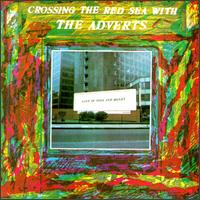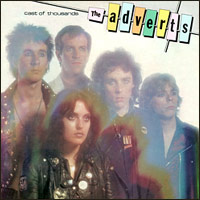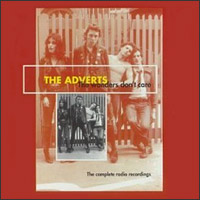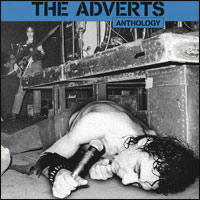|
Music Reviews
Alternative
Blues
Books
Christmas
Classic Rock
Country
Jazz
Lounge
Oldies
Power Pop
Punk & New Wave
Reggae
Rhythm & Blues
Seventies
Texas
Special Features
Randy's Rodeo
Sex Pistols
Motown
Halloween
Valentine's Day
Information
About Me
Feedback
Links
User's Guide
Support Me
Amazon
iTunes
Sheet Music Plus
|
Sock it to me, Santa! Visit my other website, www.hipchristmas.com Visit my other website, www.hipchristmas.com
 The Adverts can't
really be called a great punk group - their career was too short, their influence
too fleeting. But, their debut LP, Crossing
the Red Sea With The Adverts (1978) - which compiles the band's incendiary
early singles - is far and away one of punk's great albums. Further, the group
deserves credit for being one of the first bands to arrive on the British
scene, and one of the very first to have a significant impact on the English
charts.
But,
the
Adverts had almost no impact in America, and they imploded after their critically-dismissed,
commercially-disastrous sophomore album. The Adverts can't
really be called a great punk group - their career was too short, their influence
too fleeting. But, their debut LP, Crossing
the Red Sea With The Adverts (1978) - which compiles the band's incendiary
early singles - is far and away one of punk's great albums. Further, the group
deserves credit for being one of the first bands to arrive on the British
scene, and one of the very first to have a significant impact on the English
charts.
But,
the
Adverts had almost no impact in America, and they imploded after their critically-dismissed,
commercially-disastrous sophomore album.
Led by singer-songwriter T.V. Smith, the Adverts played genuine punk rock: fast
rhythms, buzzsaw guitars, fury and disenchantment oozing from every pore. They
did so, however, within a resolutely pop-conscious framework, allowing them
to (briefly) reach a broad audience. Perhaps even more significantly, the Adverts
prominently featured Gaye Advert on bass, who was one of the punk rock's first
female musicians. The dark, comely Ms. Advert blazed a trail for future generations
of grrl
rockers from Joan Jett to Bikini Kill to Sleater Kinney - whether they know
it or not....
 Like
so many early punk bands - in England and America - The Adverts formed in
1976 after witnessing the Sex Pistols. Soon the group was opening for the Damned,
and later, on the recommendation of Damned guitarist Brian James, they signed to
nascent Stiff Records in early 1977. Subsequently, the Adverts released just one
single for the now-legendary label. Produced by Stiff staffer Larry Wallis, "One
Chord Wonders" was widely praised, and it has served ever since as a battle
standard for inspired, noisy amateurs. This success prompted larger label Anchor
Records to scoop up the band, and their next single, "Gary Gilmore's Eyes," cemented
the Adverts' place in history. Inspired by the saga of an American murderer who opted
for the firing squad over life behind bars, the horrific song sparked a storm of
protest and flood of sales. "Gary Gilmore's Eyes" was the band's biggest
hit, peaking inside the British Top 20. Like
so many early punk bands - in England and America - The Adverts formed in
1976 after witnessing the Sex Pistols. Soon the group was opening for the Damned,
and later, on the recommendation of Damned guitarist Brian James, they signed to
nascent Stiff Records in early 1977. Subsequently, the Adverts released just one
single for the now-legendary label. Produced by Stiff staffer Larry Wallis, "One
Chord Wonders" was widely praised, and it has served ever since as a battle
standard for inspired, noisy amateurs. This success prompted larger label Anchor
Records to scoop up the band, and their next single, "Gary Gilmore's Eyes," cemented
the Adverts' place in history. Inspired by the saga of an American murderer who opted
for the firing squad over life behind bars, the horrific song sparked a storm of
protest and flood of sales. "Gary Gilmore's Eyes" was the band's biggest
hit, peaking inside the British Top 20.
Incredibly, following another terrific single ("Safety In Numbers"), Anchor
Records went bust. The Adverts quickly signed to another label (Bright Records),
though, and unleashed their fourth single, "No Time To be 21," and their
first album, Crossing
the Red Sea With The Adverts, in early 1978. The LP included newly waxed versions
of most of their 1977 singles alongside amazing new bursts of fury like "New
Church." Inexplicably, initial pressings of Crossing
the Red Sea With The Adverts omitted"Gary Gilmore's Eyes." Later versions
- most notably Fire Records' 2002 Ultimate
Edition CD - usually restore the Adverts' greatest hit to the track listing amidst
assorted bonus tracks.
 Crossing
the Red Sea is inarguably a landmark punk album. The LP marked a major milestone
on the path towards the codification of punk as a sound - a musical genre - separate
and apart from the attitude, fashion, and politics so interwoven with its genesis.
Early on, punk rock meant more than the driving riffs of the Ramones or the Sex
Pistols; rather, it encompassed everything from the synthetic pop of Lene Lovich
to the boozy, cheery choruses of Wreckless Eric. Soon - thanks in no small part
to the Adverts - punk became narrowly defined as fast, loud, guitar-based music,
eventually devolving into hardcore. But, Crossing
the Red Sea is an impressive, inventive listen from start to finish - no
small achievement regardless of genre. Crossing
the Red Sea is inarguably a landmark punk album. The LP marked a major milestone
on the path towards the codification of punk as a sound - a musical genre - separate
and apart from the attitude, fashion, and politics so interwoven with its genesis.
Early on, punk rock meant more than the driving riffs of the Ramones or the Sex
Pistols; rather, it encompassed everything from the synthetic pop of Lene Lovich
to the boozy, cheery choruses of Wreckless Eric. Soon - thanks in no small part
to the Adverts - punk became narrowly defined as fast, loud, guitar-based music,
eventually devolving into hardcore. But, Crossing
the Red Sea is an impressive, inventive listen from start to finish - no
small achievement regardless of genre.
For their part, the Adverts switched directions altogether after Crossing
the Red Sea, sparking great consternation among the faithful. Beginning with "Television's
Dead," a late-1978 single, T.V. Smith began to slow down his tempos, embrace
new sounds, and pursue markedly less obvious targets within his lyrics. Songs
like "My Place" (released six months later) sound more like early David
Bowie than anything remotely post-modern, and their very last song, "I Will
Walk You Home" is practically funereal. So, relative to their debut, Cast
Of Thousands (late 1979), sounds lackluster - dispirited, even. In retrospect,
the album is more misunderstood than mediocre, yielding several outstanding tracks
including the disquieting "Love Songs." Cast
Of Thousands, like its predecessor, is available from Fire Records as an Ultimate
Edition (2005).
 According
to Smith, the Adverts had been falling apart almost as long as they'd been
together. Predictably, given the disdain and disinterest that greeted Cast
Of Thousands, the band splintered just as their sophomore album hit the
streets - their promise unfulfilled. Not surprisingly, T.V. Smith has since
conducted a career chock with surprising twists (see
website). As for the Adverts' abbreviated catalog, both albums - especially
the first - have been reissued many times. As of this writing, the aforementioned
Fire Records reissues are the best of the lot. The
Punk Singles Collection (1997) is a very good introduction, featuring the
A- and B-sides of the Adverts' seven 45-rpm singles, while serious fans should
track down The
Wonders Don't Care, a compilation of the band's radio sessions. According
to Smith, the Adverts had been falling apart almost as long as they'd been
together. Predictably, given the disdain and disinterest that greeted Cast
Of Thousands, the band splintered just as their sophomore album hit the
streets - their promise unfulfilled. Not surprisingly, T.V. Smith has since
conducted a career chock with surprising twists (see
website). As for the Adverts' abbreviated catalog, both albums - especially
the first - have been reissued many times. As of this writing, the aforementioned
Fire Records reissues are the best of the lot. The
Punk Singles Collection (1997) is a very good introduction, featuring the
A- and B-sides of the Adverts' seven 45-rpm singles, while serious fans should
track down The
Wonders Don't Care, a compilation of the band's radio sessions.
My highest recommendation, though, is reserved for Anthology (2004),
a two-disc set compiling one version of every song the band recorded, plus
a scorching, lo-fi 1978 live set. Personally compiled and scrupulously annotated
by Smith - including his own witty, revealing track notes - Anthology alternates
between single versions, album tracks, and BBC radio sessions, chronologically
tracing the development of the Adverts from their spectacular inception to
their ignominious ending. Anthology isn't
perfect - I would have preferred the hit single version of "Gary Gilmore's
Eyes" rather than the original, unreleased Stiff version - but it stands
as the definitive account of this wrongly-but-nearly forgotten band. [top of page]
 Selected Adverts Albums Selected Adverts Albums
[top of page]
 Essential Adverts Songs Essential Adverts Songs
- Back From The Dead (1978)
-
Bored Teenagers (1977)
-
Fate Of Criminals (1979)
-
Gary Gilmore's Eyes (1977)
-
Love Songs (1979)
-
New Church (1978)
-
No Time To Be 21 (1978)
-
One Chord Wonders (1977)
-
Safety In Numbers (1977)
-
Television's Over (1978)
[top of page]
 The
Adverts On The Web The
Adverts On The Web
[top of page]
 Feedback Feedback
Your witty comments, impertinent questions, helpful suggestions, and angry denials
are altogether encouraged. Submit feedback via email;
submissions will be edited and posted at my discretion.
|
|